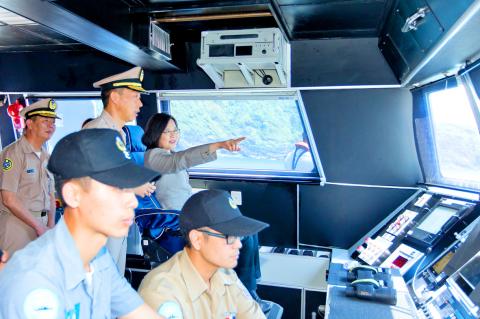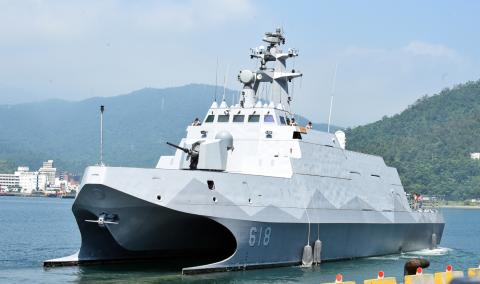A military source on Friday confirmed plans for the production of an upgraded version of the navy’s Tuo Chiang-class stealth corvette that is to incorporate expanded anti-aircraft capabilities.
The new vessel type is to be longer, wider and equipped with 3D radar systems and a ship-to-air version of the Tien Chien II (“Sky Sword”) guided missile system.
A total of 11 vessels are to be produced in three lots, for a total of 12 ships including the original Tuo Chiang-class corvette, the source said.

Photo courtesy of the Military News Agency
The navy plans to begin operating three of the new vessels and make design adjustments where needed before commissioning the subsequent two lots, the source said, adding that the first lot is scheduled to be completed by 2025 at a cost of NT$14.434 billion (US$471.68 million).
Navy contractors are to submit final designs by the end of this month, when final bidding for the contract is also to take place, the source said.
The displacement of the upgraded vessels is to increase by about 100 tonnes from the current model’s 567 tonnes. They are also being designed to reach a maximum speed of more than 30 knots (55.56kph), the source said.

Photo: Liu Hsin-de, Taipei Times
The class’ length is to be increased from 60.4m to 65m, while width is to increase from 14m to 15m and draft is to increase from 2.3m to 3m, the source said.
The size increases would result in ships of the upgraded class being able to carry more personnel, from the original vessel’s 41 crew to 53, with sleeping quarters to be adjusted to accommodate the additional personnel, the source said.
The decision to upgrade the Tuo Chiang-class corvette was based primarily on a need to improve its anti-aircraft capabilities, the source said, adding that the Tien Chien II missile and 3D radar systems would complement the current model’s Hsiung Feng II and Hsiung Feng III (“Brave Wind”) anti-ship missiles.
“The Hsiung Feng and Tien Chien missile systems can be combined in whatever configuration the mission calls for,” the source added.
The biggest visible change would be to the radar mast, which is to be larger on the upgraded vessels due to the 3D radar system, the source said.
The bridge on the new vessels would be larger than the original’s, with a closed tower-style mast containing the radar system fitted above, the source added.

SECURITY: As China is ‘reshaping’ Hong Kong’s population, Taiwan must raise the eligibility threshold for applications from Hong Kongers, Chiu Chui-cheng said When Hong Kong and Macau citizens apply for residency in Taiwan, it would be under a new category that includes a “national security observation period,” Mainland Affairs Council (MAC) Minister Chiu Chui-cheng (邱垂正) said yesterday. President William Lai (賴清德) on March 13 announced 17 strategies to counter China’s aggression toward Taiwan, including incorporating national security considerations into the review process for residency applications from Hong Kong and Macau citizens. The situation in Hong Kong is constantly changing, Chiu said to media yesterday on the sidelines of the Taipei Technology Run hosted by the Taipei Neihu Technology Park Development Association. With

A US Marine Corps regiment equipped with Naval Strike Missiles (NSM) is set to participate in the upcoming Balikatan 25 exercise in the Luzon Strait, marking the system’s first-ever deployment in the Philippines. US and Philippine officials have separately confirmed that the Navy Marine Expeditionary Ship Interdiction System (NMESIS) — the mobile launch platform for the Naval Strike Missile — would take part in the joint exercise. The missiles are being deployed to “a strategic first island chain chokepoint” in the waters between Taiwan proper and the Philippines, US-based Naval News reported. “The Luzon Strait and Bashi Channel represent a critical access

‘FORM OF PROTEST’: The German Institute Taipei said it was ‘shocked’ to see Nazi symbolism used in connection with political aims as it condemned the incident Sung Chien-liang (宋建樑), who led efforts to recall Democratic Progressive Party (DPP) Legislator Lee Kun-cheng (李坤城), was released on bail of NT$80,000 yesterday amid an outcry over a Nazi armband he wore to questioning the night before. Sung arrived at the New Taipei City District Prosecutors’ Office for questioning in a recall petition forgery case on Tuesday night wearing a red armband bearing a swastika, carrying a copy of Adolf Hitler’s Mein Kampf and giving a Nazi salute. Sung left the building at 1:15am without the armband and apparently covering the book with a coat. This is a serious international scandal and Chinese

COUNTERINTELLIGENCE TRAINING: The ministry said 87.5 percent of the apprehended Chinese agents were reported by service members they tried to lure into becoming spies Taiwanese organized crime, illegal money lenders, temples and civic groups are complicit in Beijing’s infiltration of the armed forces, the Ministry of National Defense (MND) said in a report yesterday. Retired service members who had been turned to Beijing’s cause mainly relied on those channels to infiltrate the Taiwanese military, according to the report to be submitted to lawmakers ahead of tomorrow’s hearing on Chinese espionage in the military. Chinese intelligence typically used blackmail, Internet-based communications, bribery or debts to loan sharks to leverage active service personnel to do its bidding, it said. China’s main goals are to collect intelligence, and develop a